 |
 |
 |
A Global Unified Vision For Neuroscience
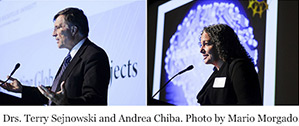 TDLC scientists Drs. Terry Sejnowski and Andrea Chiba participated in an exciting Global Brain Initiative Meeting at Rockefeller University in New York on Sept. 19, 2016. The purpose of the meeting: To learn about brain projects around the world, to gather project leaders for possible future collaboration, and to prioritize projects, goals, and funding. TDLC scientists Drs. Terry Sejnowski and Andrea Chiba participated in an exciting Global Brain Initiative Meeting at Rockefeller University in New York on Sept. 19, 2016. The purpose of the meeting: To learn about brain projects around the world, to gather project leaders for possible future collaboration, and to prioritize projects, goals, and funding.
Over 400 participants attended the gathering. They came from diverse backgrounds that included neuroscientists, computational biologists, physicists, physicians, ethicists, and representatives from charities, private companies and national brain research initiatives. During this collaborative "meeting of the minds," Dr. Chiba spoke about the concept of a Global Science of Learning, and Dr. Sejnowski oversaw the wrap-up session. More |

THE ETHICS OF EMERGING TECHNOLOGIES
TDLC scientists Andrea Chiba and Terry Sejnowski, together with Patricia Churchland (UCSD Emeritus Philosophy Professor) and Roger Bingham (UCSD TDLC and The Collaboratory) were awarded a grant from the National Science Foundation to create a cross-disciplinary network of scientists and ethicists to consider the ethical use of a select set of emerging technologies for application to the science of learning, education, rehabilitation, medicine, and augmented humans.
They invite you to participate in this dialog in two public events being held in San Diego, in November:
- Are you ready for tomorrow’s world? Enhancing humans – what are the limits? November 10 from 1:00-3:00 pm
- Are you and your children really ready for Tomorrow's World?
A Conversation in the Round, held at the San Diego Public Library
from 5:00-7:00 pm
Click here for more information about the event!
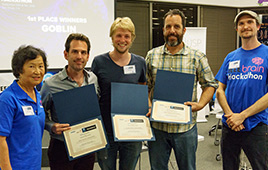 Team Goblin wins first place in the inaugural San Diego Brain Hackathon! Team Goblin wins first place in the inaugural San Diego Brain Hackathon!
The weekend of Sept. 10, 2016,TDLC investigators John Iversen and Alex Khalil, along with Joseph Heng (a visiting Masters student from Switzerland) entered a two-day Brain Hackathon as "Team Goblin." Their goal was to learn how to create a classroom-scale fun brain game, to introduce children to the idea of EEG and brain computer interfaces. To their surprise and delight, they won first place! The competition was organized by Qusp & CWLab International and sponsored by IEEE (Institute of Electrical and Electronics Engineers) Brain Initiative. More
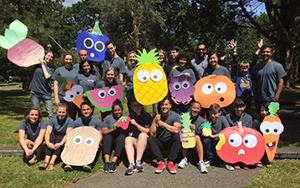 Face Camp 2016 Face Camp 2016
In June, 124 children, including 23 children with special needs, attended this summer’s Face Camp. Conducted at the University of Victoria in British Columbia, and organized by TDLC's Dr. Jim Tanaka, Face Camp is a free, one day workshop where typically developing and special needs children learn about the "science, art, and fun" of human face recognition. Learn more!
 Lily Marapao, Human Resource Manager, is Retiring From UC San Diego After 31 years Lily Marapao, Human Resource Manager, is Retiring From UC San Diego After 31 years
Lily began working at UCSD in 1985 in the Accounting Office, and joined the Institute for Neural Computation (INC) in 2001. She has seen INC go through many changes in the 15 years that she has been here. She shares, "I am so proud of what INC has done and how its existence has made such an impact on research and the multi-disciplinary collaborators it has successfully brought together. It has been a privilege to have been associated with INC and its many prestigious scientists and researchers in the field of neural computation. Managing the administrative facets of a growing research unit within UCSD is both humbling and challenging at the same time, and has enabled me to further my career. For this opportunity I am very grateful. I will miss the friends I have made at INC and being part of a great team!"
|
|
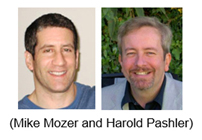 Digital textbook scribbles, highlights could give students a
learning leg up Digital textbook scribbles, highlights could give students a
learning leg up
(CU Boulder Today, 8/23/16)
TDLC researchers Drs. Michael Mozer and Hal Pashler are involved in a project that will allow the development of “smart” annotated online textbooks "to gain a better understanding of a particular learner’s state of mind and grasp of subject matter." The project, funded by a four-year, $1 million grant from the National Science Foundation (NSF), has been created by researchers at the University of Colorado Boulder, Rice University and UC San Diego. Article  Click here to read an interview with Dr. Mike Mozer about the project! Click here to read an interview with Dr. Mike Mozer about the project!
|
|
|
| |
| |
|
This message was sent from:
The Temporal Dynamics of Learning Center (TDLC.UCSD.EDU),
University of California, San Diego,
9500 Gilman Drive, La Jolla, CA 92093
To learn more about TDLC, please visit us on the web at: TDLC.UCSD.EDU
Please contact webmaster@tdlc.ucsd.edu to unsubscribe.
TDLC is a Science of Learning Center (SLC),
one of six SLCs funded by the National Science Foundation. NSF grant #SMA 1041755
|
|
 |
 |
November 2016 |
|
 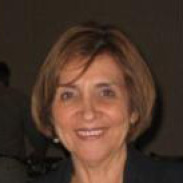
TDLC's The Educator Network (TEN)
Check out the latest discussions and forum topics on the TEN website here!
|
|
|
 |
 |
Scientists Adapt Computer Program to Gauge Eye Spasm Severity
(Scicasts, 10/25/16)
TDLC researchers Drs. Peterson, Littlewort, and Sejnowski, and former TDLC scientist Bartlett, were co-authors along with other colleagues at the Salk Institute! More
|
 |
Johns Hopkins and Salk Co-Lead $15 Million Initiative to Unravel Bipolar Disorder and Schizophrenia
(The Salk Institute, 8/31/16 )
The consortium will be led by Hongjun Song, Ph.D., of Johns Hopkins and TDLC Investigator Rusty Gage, Ph.D., of Salk.
More
|
 |
Qusp Recognized on the TransTech200 List of scientists and engineers advancing tech worldwide for mental and emotional wellbeing! (TransTech200)
Qusp, founded by former TDLC member Tim Mullen. More |
 |
Scientists Uncover Common Cell Signaling Pathway Awry in Some Types of Autism
(Newswise, 8/26/16)
TDLC investigator Dr. Fred Gage was part of the study, published in Molecular Psychiatry. More |
 |
Neuroscientists stand up for basic cell biology research (Science Daily, 8/25/16)
TDLC's Dr. Terry Sejnowski co-authored an article published in the journal Science.
More
|

|
The brain is divided down the middle into two hemispheres that look almost identical, but they actually perform different tasks. In this way, the brain "splits up tasks to maximize efficiency."
"The brain's right hemisphere controls the muscles on the left side of the body, while the left hemisphere controls the muscles on the right side of the human body. The two hemispheres communicate information to each other through the corpus callosum that connects them. In general, the left hemisphere is dominant in language. It helps us speak and process what we hear. It is also in charge of carrying out mathematical computations and retrieving facts from your memory. The right hemisphere is mainly in charge of spatial abilities, face recognition and processing music."
(reference: LiveScience)
|
|
|
|
 |

![]()
